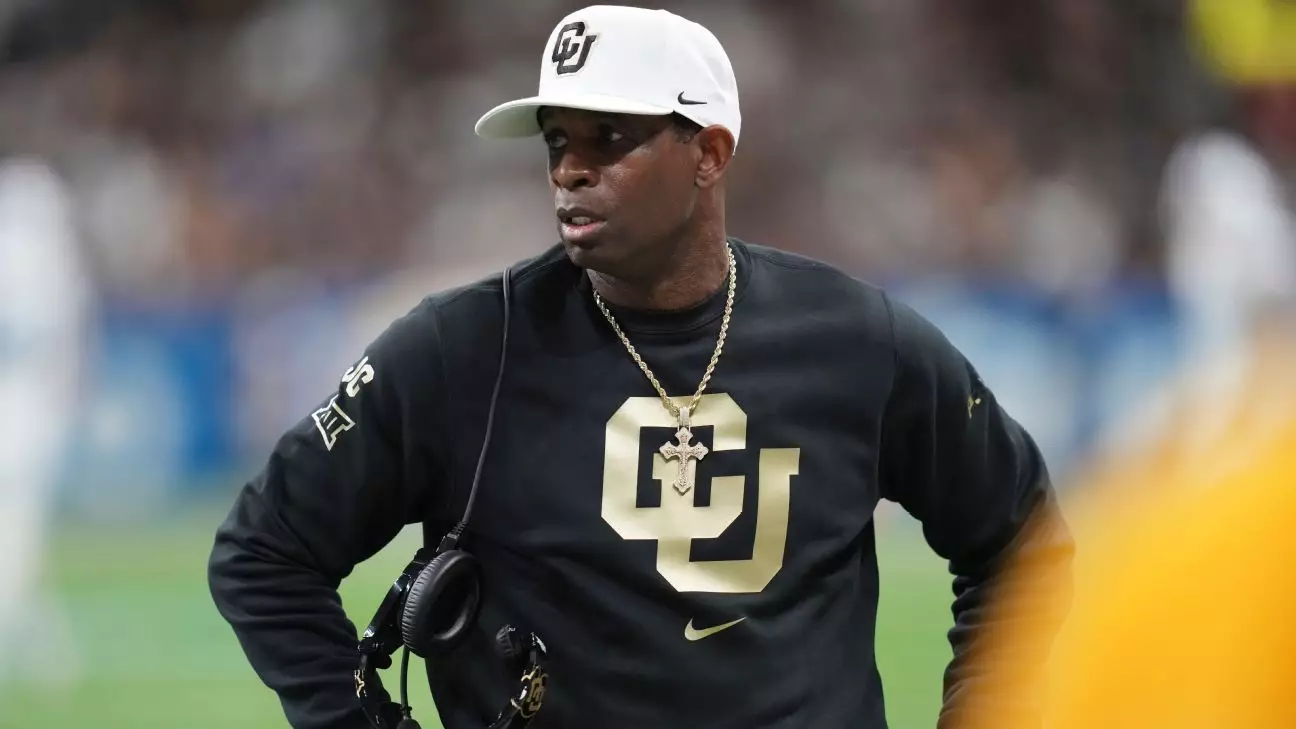Deion Sanders, a name synonymous with dual sports success and electric personality, recently made headlines by choosing to remain as the head coach of the University of Colorado’s football team despite interest from the NFL’s Dallas Cowboys. This decision marks a pivotal moment in Sanders’ coaching career, especially given the backdrop of a team yearning for revival alongside a storied franchise looking to make a fresh start.
Sanders’ charisma and larger-than-life persona, often dubbed “Prime Time,” has consistently drawn attention across various domains, especially in professional football. During a recent episode of his talk show, “We Got Time Today,” Sanders spoke candidly about his reluctance to transition back into coaching at the NFL level. Reflecting on his experiences with past teammates, such as Troy Aikman, he acknowledged the contrasting nature of practices and player engagement from his time with the Cowboys in the ’90s to today’s NFL environment. The reality of modern professional football, with its intense, rigorous schedules and high-stakes atmosphere, has persuaded Sanders to prioritize his current engagement at Colorado over a return to the pros.
The essence of Sanders’ reluctance reflects a deeper philosophical stance regarding the game. He emphasized his love for football and a commitment to developing young talent on a trajectory that aligns with his values as a former player deeply invested in the sport’s integrity.
Sanders’ coaching journey has not been without its challenges. Holding a record of 13-12 over his two seasons with Colorado, he demonstrated a commitment to rejuvenating a program that historically faced difficulties. Under his leadership, Colorado experienced a breakout 9-4 season where Travis Hunter, a standout athlete in Sanders’ system, won the prestigious Heisman Trophy. This achievement showcased Sanders’ ability to harness talent and elevate performance, signaling a success that contrasts starkly with the Cowboys’ current trajectory.
By choosing to steer clear of NFL coaching opportunities, Sanders highlights an essential distinction in his coaching philosophy. His focus is not solely on wins and losses but rather on creating a nurturing environment for athletes at the collegiate level. For Sanders, the emphasis lies in mentoring young men and guiding them towards realizing their potential, reflective of his prolonged commitment to developing players rather than exclusively winning championships.
Sanders’ potential connection with the Cowboys had raised eyebrows, particularly considering the organization’s historical significance and Sanders’ previous contributions as a player. Aikman, who shared a locker room with Sanders during their glory days, expressed disappointment regarding the Cowboys not formally pursuing Sanders. Observations within the NFL community revealed mixed reactions to the organizational decision to appoint offensive coordinator Brian Schottenheimer, rather than a figure like Sanders, who, according to Aikman, possesses the necessary gravitas to command authority as a head coach.
Further complicating matters, Aikman shared that some of Sanders’ former teammates voiced frustrations regarding Jerry Jones’ hesitance to engage Sanders formally. The sentiment among players, who are keenly aware of the intangible qualities that a coach must have, speaks to the missed opportunity for the Cowboys to reconnect with their rich history while reinforcing a leadership style that commands respect and attention.
For now, Deion Sanders remains committed to the University of Colorado, where he actively shapes young talent in a more controlled environment conducive to growth and learning. His refusal to return to the NFL signifies not just a decision influenced by organizational culture, but also an assertion of his coaching identity. The ever-evolving landscape of college football presents numerous opportunities for success, and as Sanders continues to redefine his role within the sport, the impact of his leadership will undoubtedly shape the future of Colorado football for seasons to come.
As fans observe this chapter of Sanders’ career unfold, one thing is evident: whether he remains in college coaching or eventually returns to the professional arena, his influence on the game—both on and off the field—will persist long after his whistle blows.


Leave a Reply